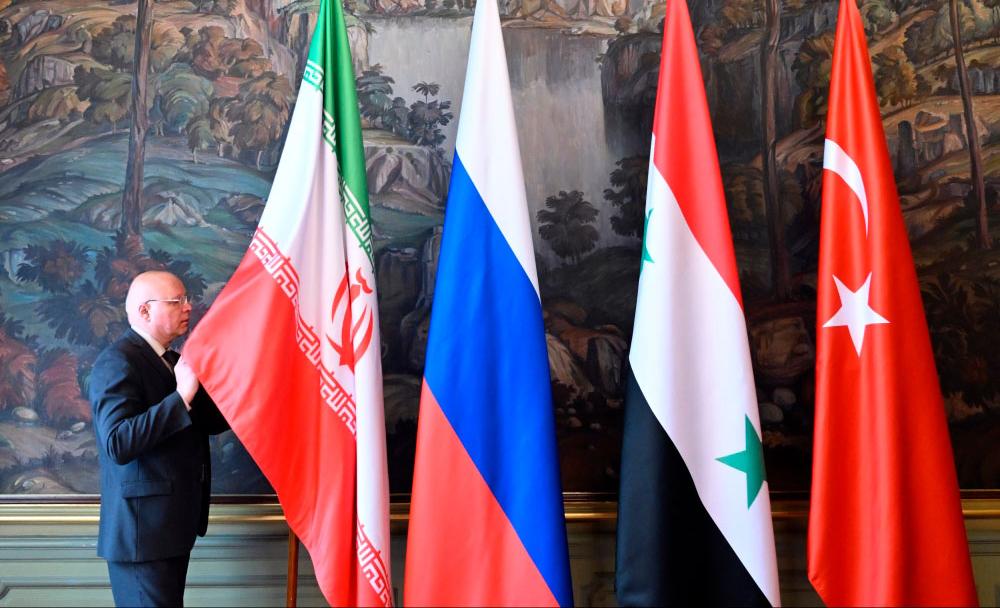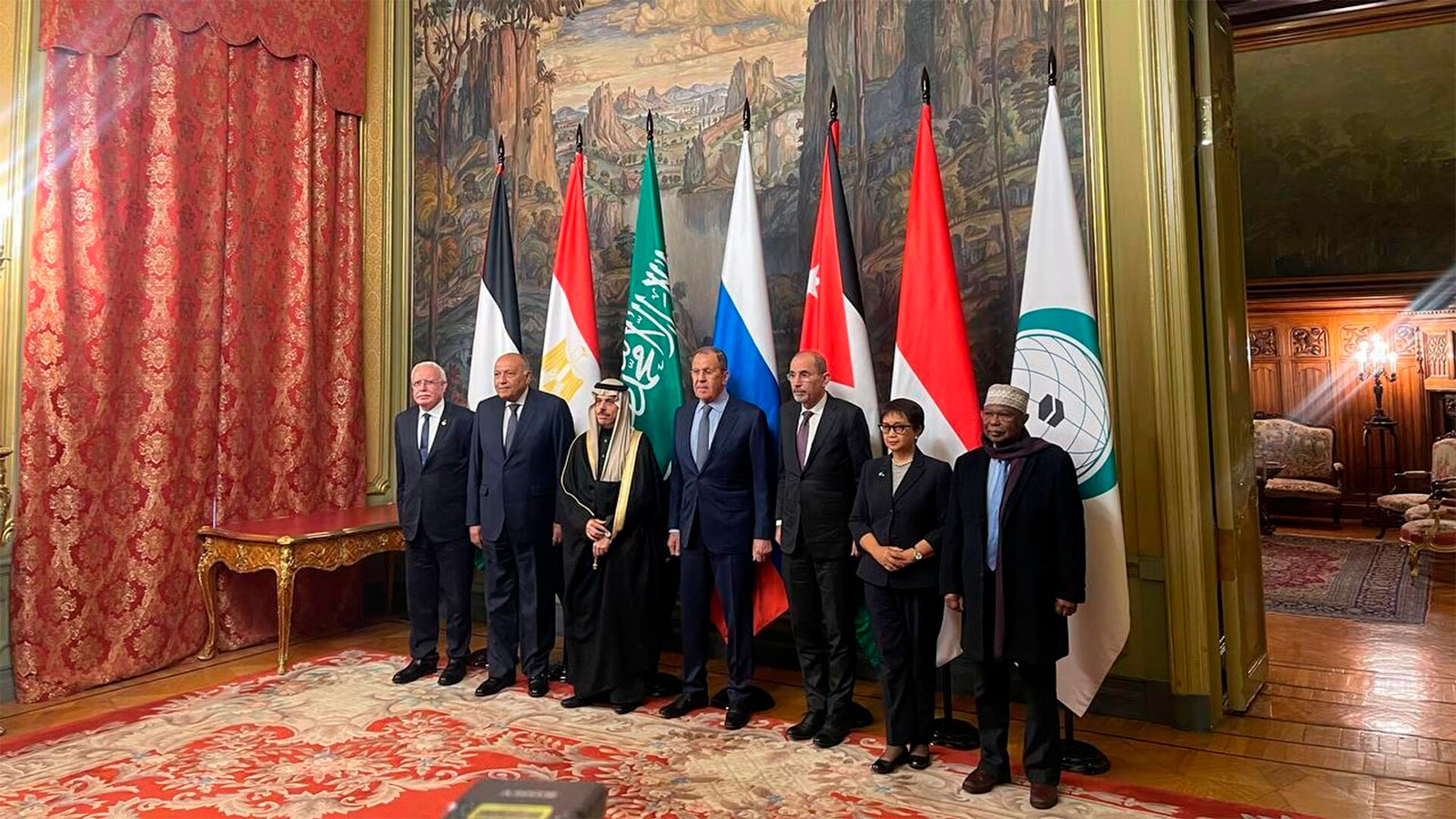Following this somewhat arbitrary analogy, the role of the joker in the card deck that is the Middle East, should be given to none other than Iran. After all, the joker is usually the strongest card in the deck, and can often replace any other card. It is the only card that does not belong to any suit; the joker is always on its own, and it comes out when you least expect it.
For a long time, the main goal in the US Middle East strategy was to neutralize the role of Iran as the joker. One after another, US presidents have tried to convince the international community that the main problem in the Middle East was not even the Israeli-Palestinian conflict, but rather Tehran’s “regional hegemonism.”
The events of October 7, 2023, and all that followed since, unequivocally and dramatically demonstrated the failure of the American strategy. They brought the Israeli-Palestinian conflict back to the center of the Middle East agenda, confirming the obvious truth: without a solution to the Palestinian problem, sustainable peace in the region is unattainable.
Nevertheless, Iran remains the most important and special card in the Middle East’s political deck; in many respects, it is very different from all other regional players. It is very difficult to create a sustainable security system together with “informal” Tehran, and it is most likely impossible to build this system without Iran or, even more so, against it.
The current Iranian political system is approaching its 50th anniversary and has repeatedly demonstrated remarkable resilience and adaptability in the face of severe adversity – including an eight-year bloody war with Iraq, periodic waves of mass street protests, and numerous sanctions. There is no reason to believe that today’s Iran is on the verge of political regime change. Rather, the opposite is true: it is Iran that is now an island of relative stability amid the raging sea of the Middle East upheavals.
Tehran is carefully weighing political and military risks, figuring out the possible consequences of its every step. In many cases, Iran acts as a conservative force, advocating the preservation of the regional status quo.
Undoubtedly, Iran has its own international ambitions and claims to influence in the Middle East, related to history, religion and culture, not to mention purely economic interests or Iranian diasporas in the UAE, Kuwait, Iraq and Turkey. Some of these claims cannot go unrecognized, while others can be questioned or challenged. However, none of the neighboring states have been able to simply dismiss them in the past and will not be able to do so in the future. It should also be remembered that, unlike its Arab opponents or even Israel, Iran is not dependent on external security providers—it is quite self-sufficient, as befits a true joker.
The current situation in the region may well prove to be a historical fork in the road for both Iran and the Middle East as a whole. What will ultimately prevail: the usual fears and suspicions of many Arab states about Tehran’s intentions and actions, or the new sense of unity in the Islamic world that has been awakened by the events in Gaza?
In the former case, the old lines of confrontation between Arabs and Persians, Sunnis and Shiites, secular and theocratic regimes will be splitting the region again and again. US attempts to isolate Tehran as much as possible will resume, especially if Donald Trump returns to the White House.
In the latter case, hopes for continuing the détente between Iran and its Arab neighbors, initiated in March 2023 by the Iranian-Saudi dialogue mediated by Beijing, will continue. Such a détente, in turn, could be the first step toward integrating the Islamic Republic into the regional security system.
Last Sunday, February 11, Iran celebrated the 45th anniversary of the 1979 Islamic Revolution. Celebratory rallies were held in over 1,400 towns and 35,000 villages across the country. In Tehran, Iranian President Ibrahim Raisi spoke to the participants of the festive processions.
It is well known that Islam does not approve of card games. It is believed card games lead to gambling and create terrible addictions that distract people from spiritual growth and improvement. However, the complex, confusing, and often dramatic events in the Middle East inevitably evoke associations with it being a card game, where the stakes are high and the deck is intricately shuffled.
Following this somewhat arbitrary analogy, the role of the joker in the card deck that is the Middle East, should be given to none other than Iran. After all, the joker is usually the strongest card in the deck, and can often replace any other card. It is the only card that does not belong to any suit; the joker is always on its own, and it comes out when you least expect it.
For a long time, the main goal in the US Middle East strategy was to neutralize the role of Iran as the joker. One after another, US presidents have tried to convince the international community that the main problem in the Middle East was not even the Israeli-Palestinian conflict, but rather Tehran’s “regional hegemonism.”
Various ways of solving the “Iranian problem” were proposed, including the creation of the broadest possible anti-Iranian coalitions, increased economic and diplomatic pressure on Tehran, as well as tough confrontation with Shiite groups in Syria, Lebanon, Iraq, Yemen, and elsewhere in the region. The “Abraham Accords” were promoted, ideas of creating an Arab equivalent of NATO were thrown around, American military infrastructure in the Gulf zone was modernized, and assassination attempts on Iranian military leaders were made. Some politicians generally stated that the end result of all these efforts should be a political regime change in the Islamic Republic, so that the uncontrollable joker would turn into an obedient American stooge.
The events of October 7, 2023, and all that followed since, unequivocally and dramatically demonstrated the failure of the American strategy. They brought the Israeli-Palestinian conflict back to the center of the Middle East agenda, confirming the obvious truth: without a solution to the Palestinian problem, sustainable peace in the region is unattainable.
Nevertheless, Iran remains the most important and special card in the Middle East’s political deck; in many respects, it is very different from all other regional players. It is very difficult to create a sustainable security system together with “informal” Tehran, and it is most likely impossible to build this system without Iran or, even more so, against it.
However, the analogy with the joker has its very specific limits. Iran is not some primitive and archaic theocratic dictatorship capable of any unpredictable regional escapades, as the West likes to portray it. Iran is a very complexly organized society and its political system has numerous built-in checks and balances. Any president or rahbar must account for the numerous multidirectional economic, political, ethno-religious, and regional interests, which do not only shape opportunities but also create constraints on Iranian foreign policy.
The current Iranian political system is approaching its 50th anniversary and has repeatedly demonstrated remarkable resilience and adaptability in the face of severe adversity – including an eight-year bloody war with Iraq, periodic waves of mass street protests, and numerous sanctions. There is no reason to believe that today’s Iran is on the verge of political regime change. Rather, the opposite is true: it is Iran that is now an island of relative stability amid the raging sea of the Middle East upheavals.
Tehran is carefully weighing political and military risks, figuring out the possible consequences of its every step. In many cases, Iran acts as a conservative force, advocating the preservation of the regional status quo. The radical rhetoric heard in Tehran is mostly intended for domestic audiences, and the degree of this rhetoric may vary depending on the specific objectives of the political leadership.
Undoubtedly, Iran has its own international ambitions and claims to influence in the Middle East, related to history, religion and culture, not to mention purely economic interests or Iranian diasporas in the UAE, Kuwait, Iraq and Turkey. Some of these claims cannot go unrecognized, while others can be questioned or challenged. However, none of the neighboring states have been able to simply dismiss them in the past and will not be able to do so in the future. It should also be remembered that, unlike its Arab opponents or even Israel, Iran is not dependent on external security providers—it is quite self-sufficient, as befits a true joker.
The current situation in the region may well prove to be a historical fork in the road for both Iran and the Middle East as a whole. What will ultimately prevail: the usual fears and suspicions of many Arab states about Tehran’s intentions and actions, or the new sense of unity in the Islamic world that has been awakened by the events in Gaza?
In the former case, the old lines of confrontation between Arabs and Persians, Sunnis and Shiites, secular and theocratic regimes will be splitting the region again and again. US attempts to isolate Tehran as much as possible will resume, especially if Donald Trump returns to the White House.
In the latter case, hopes for continuing the détente between Iran and its Arab neighbors, initiated in March 2023 by the Iranian-Saudi dialogue mediated by Beijing, will continue. Such a détente, in turn, could be the first step toward integrating the Islamic Republic into the regional security system.
It is clear that the dynamics in the Middle East depend to a large extent on the decisions made in Tehran. Is the Iranian leadership ready to be flexible, is it willing to make compromises, and should goodwill gestures be expected from Iran to its Arab neighbors? So far, all these questions remain open ended.
If to return to the card game analogy, the preferred future “game” for Middle East security is not blackjack, where the lucky winner can sweep the board. Rather, the preferred future should resemble a game of solitaire, in which each card must find its own specially designated place.






